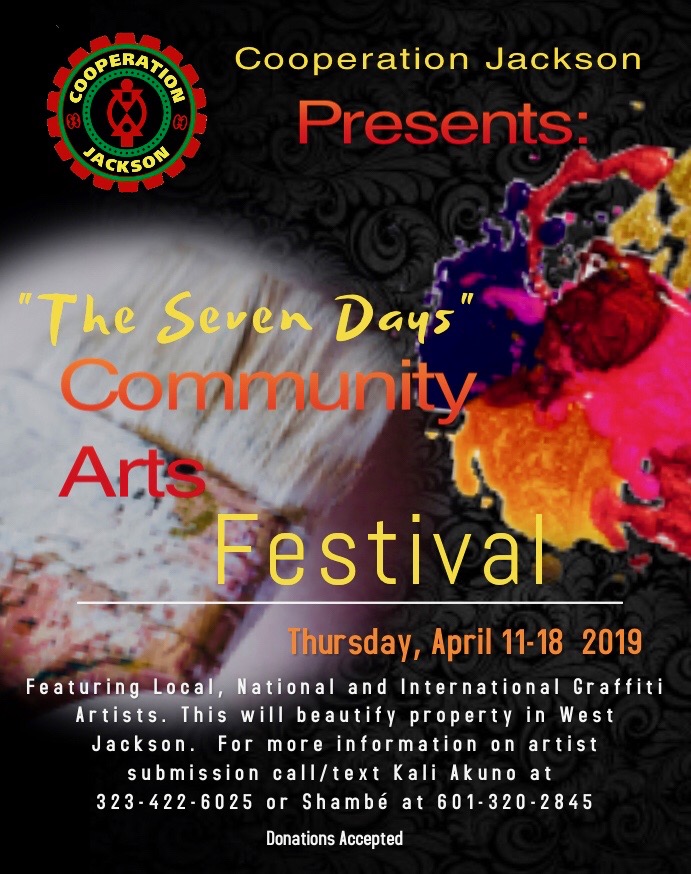A conversation with Kali Akuno, organizer with Cooperation Jackson and the Malcolm X Grassroots Movement.
By Sarah Lazare / AlterNet
January 1, 2017
“We cannot and should not legitimize the transfer of authority to a right-wing populist who has neo-fascist orientations,” Kali Akuno told AlterNet over the phone. “We shouldn’t legitimize that rule in any form or fashion. We need to build a program of being ungovernable.”
As the co-director of the Mississippi-based group Cooperation Jackson and an organizer with the nationwide Malcolm X Grassroots Movement, Akuno is one of countless people across the country working diligently to build a platform sturdy enough to confront Trump’s America.
Movimiento Cosecha, led by undocumented people and immigrants, is planning to go on the offensive to organize a migrant boycott and general strike demanding “permanent protection, dignity, and respect of immigrants.” Groups including Desis Rising Up and Moving (DRUM) are already striking preemptive blows against a potential Muslim registry under Trump by successfully demanding that the Obama administration eliminate the regulatory framework for a Bush-era registry. The New Sanctuary Movement, meanwhile, is getting ready to mobilize large numbers of people to intervene against a potential escalation of raids targeting immigrants.
For Akuno, whose organizations strive for self-determination for people of African descent and the eco-socialist transformation of society as a whole, now is an important time for movements to be talking to each other and strategizing how to unfold a program of noncompliance and noncooperation on both the federal and state levels. “We are not going to legitimize this regime, and we are going to try to draw a deeper level of criticism to the entire system,” he emphasized. “If Trump and Clinton were the best the system could offer, there is something wrong with the system. There always has been. We need to start envisioning what kind of future we want and need.”
A call for civil servants to resist
“A core component of resistance is to get the class of civil servants, particularly on the federal but also the state level, to not comply with arbitrary laws and policies that are going to be created,” said Akuno. “To not recognize the laws we know are coming that will discriminate against Black people, Latinos, immigrants and queer people. There is no need for anyone to comply. Let’s not give it legitimacy just because it’s the law. We need to be prepared to disobey and engage in civil disobedience. We need to get ready for that now.”
Akuno said there are already encouraging signs that such resistance is building among civil servants. Concerned that critical climate data will vanish under a climate-change denying Trump administration, scientists and meteorologists are working to copy and safely store public data using independent servers. Earlier this month, the University of Toronto held a “Guerrilla Archiving” event inviting volunteers to “join in a full day of hackathon activities in preparation for the Trump presidency.” The website “Climate Mirror” was erected as part of an effort to “mirror public climate datasets before the Trump Administration takes office to make sure these datasets remain freely and broadly accessible.”
Meanwhile, media reports are emerging that some Department of Energy officials are refusing to comply with a Trump administration demand to hand over the names of all of the agency’s contractors and employers who have worked on key climate policies under President Barack Obama. The request elicited concerns of a witch hunt and purge orchestrated by the incoming administration. But The Independent reported earlier this month, “The US Department of Energy (DOE) has refused to answer questions issued to them by Donald Trump’s transition team.”
In a letter dated December 28, attorney general offices from 13 states threatened litigation against Trump if he discards the Clean Power Plan, as he has vowed to do.
Such resistance, of course, contrasts with the narrative of a “peaceful transition of power” at times embraced by the Obama administration and much of the Democratic party. But among lower-level workers, opportunities for resistance are manifold. According to Akuno, “it is impressive to see a certain level of resistance that members of civil society are already engaging in. I don’t think this should be taken lightly. A broad alliance can be made, with a clear articulation of a call for resistance.”
Akuno emphasized that such resistance is just one prong of a broader strategy that he says entails “not going to work, not participating in your run-of-the-mill economic activities, with the hope and aim that we can build prolonged acts of civil disobedience that lead to a general strike.” While such plans are not fully fleshed out, he noted organizations across the country are actively discussing such a possibility.
‘Build and fight’
Strategies for large-scale disobedience should be buttressed by local plans that simultaneously prepare us for survival and orient us towards social transformation, he argued. “Cooperation Jackson is in the midst of a pivot that we’re calling, ‘Build and Fight,’” said Akuno, explaining that the initiative is premised on the assumption that “the left’s infrastructure domestically and internationally is profoundly weak. There needs to be a building piece in our view. This has to be a primary focus, and we want to build something that leans in an anti-capitalist orientation, like community-production based, cooperatively-owned digital fabrication.”
For inspiration, Cooperation Jackson looks to Black freedom organizers like Fannie Lou Hamer, who, in 1969, helped found the Freedom Farm Cooperative in Sunflower County, Mississippi, which was aimed at boosting food security and independence for Black community members who faced systematic dispossession. The Federation of Southern Cooperatives, meanwhile, has played a critical role in protecting those communities on the frontlines of Black freedom and civil rights movements.
According to Akuno, now is a time to fortify infrastructure for autonomy and resistance. “That’s where co-ops, land trusts, time banking, mutual exchange, community production and other new social relationships come in,” he said. “We want to build society in a prefigurative way. We want a guaranteed level of food security and energy security. We need bottom-up solutions to sustain ourselves and transform the world.”
Towards this end, Cooperation Jackson is building three green cooperatives, as well as an eco-village, protected by a community land trust. These bottom-up alternatives are coupled with a push for policies aimed at a “just transition” away from policies that worsen climate change and environmental racism.
In materials emailed to AlterNet, the organization explained that its approach is “premised on ending our systemic dependence on the hydro-carbon industry and the capitalist driven need for endless growth on a planet with limited resources, while creating a new, democratic economy that is centered around sustainable methods of production and distribution that are more localized and cooperatively owned and controlled.”
“We need to be building participatory democratic structures from below,” Akuno emphasized. “We should be building people’s assemblies, not as a substitute of the state, but to deal with areas where the neoliberal state is failing to provide basic social services.”
Learning from history
“This moment calls us to really look at our collective history critically,” said Akuno. “In reality, this is not a democratic society, never has been. But, it’s based on democratic myths, not the concrete practice of democracy. We can look at the struggles of indigenous, Black, Xican@, Puerto Rican communities and draw new lessons. We can win genuine multiracial class unity that can benefit us during this time of struggle."
Akuno emphasized that there are plenty of lessons to be learned from struggles around the world. “In the 1950s through 80s, movements fought the right-wing neo-fascist dictatorships of Argentina and Chile,” he said. “It took decades to turn the tide, people were organizing on an underground basis after most of the left was liquidated. How folks organized and delegitimized the regime—I think there’s a lot to be learned from that.”
From South Africa’s anti-apartheid movement to Spain’s civil war to 1930s-era Germany, Akuno emphasized that we need to “use history as a guide.” But he also underscored that we have to recognize what is unique about this moment, which he says emerges from a uniquely American legacy of “white supremacy in its segregationist apartheid form.”
“The orientation we’re taking is not just about surviving Trump, but drawing attention to the fact that the system was already heading towards more severe types of repression, surveillance and austerity,” he said. “We’re also looking at the global dynamics as to why right-wing populism and fascism is spreading internationally.”
What is clear, says Akuno, is that the right-wing populism of the Trump administration will not be defeated by civil discourse and liberal democracy. He emphasized, “If we are serious and steadfast, we can create a clear and comprehensive message around being ungovernable.”


















